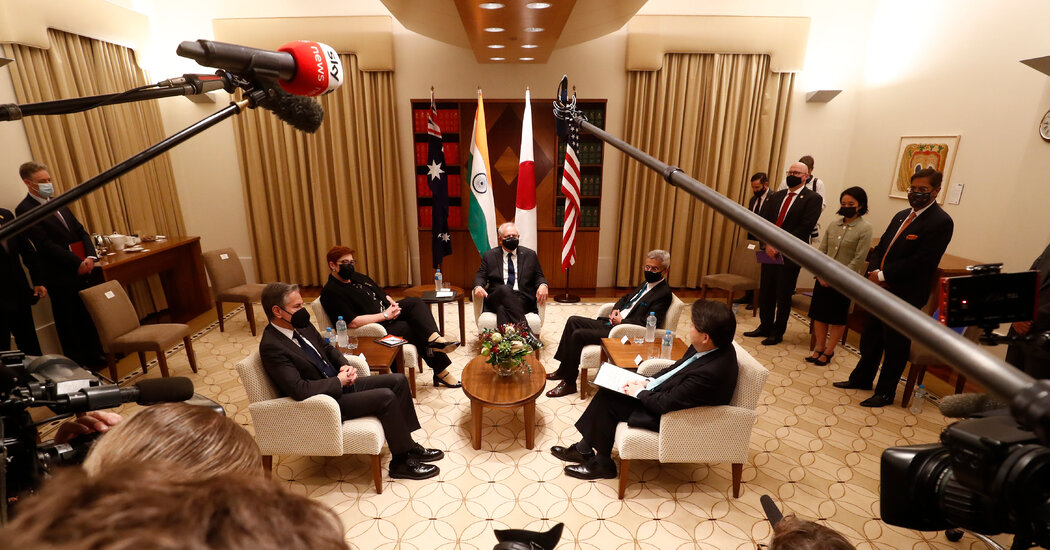
MELBOURNE, Australia — With Europe bracing for the possibility of its biggest ground war in decades, the American secretary of state, Antony J. Blinken, took a 27-hour flight this week in the opposite direction.
On Friday, Mr. Blinken met with the foreign ministers of Australia, Japan and India at a summit in Melbourne of the four-nation coalition called the Quad. His message was clear: Despite crises in Ukraine and elsewhere in the world, the United States is committed to bolstering its presence across Asia and presenting a different vision of the future than the one offered by China.
“Countries deserve to have the freedom to work together and associate with whom they choose,” Mr. Blinken said as he stood alongside the other foreign ministers before their meeting on Friday afternoon.
Australia is only the first of three stops for Mr. Blinken, who is also scheduled to meet with foreign officials in Fiji and Hawaii. The weeklong trip to the farthest reaches of Asia and the Pacific shows the intensity with which the Biden administration wants to signal that the vast region is the most important focus of its foreign policy.
In late January, Mr. Blinken had to do shuttle diplomacy in Kyiv and other European cities to address Russia’s aggression toward Ukraine. Since then, President Vladimir V. Putin has continued massing troops along Russia’s border with Ukraine for what could be a deadly follow-up to his forceful annexation in 2014 of the Crimean Peninsula and incursion into eastern Ukraine.
Mr. Blinken said at an evening news conference in Melbourne after the ministers had met that a Russian invasion could even occur before the end of the Winter Olympics in Beijing, an event at which Mr. Putin and President Xi Jinping of China issued a long joint statement in which they said the partnership of the two nations had “no limits.”
“We continue to see very troubling signs of Russian escalation, including new forces arriving at the Ukrainian border,” Mr. Blinken said.
While Mr. Blinken and some of his foreign counterparts did discuss Russia and Ukraine, that was not the focus of their talks. The Quad, which has gained momentum in recent years after being established in 2007, is an important part of President Biden’s vision for countering China, which has a powerful economic presence in every corner of the globe and a growing military footprint in Asia and parts of the Indian Ocean.
The coalition also seeks to address broad regional issues, and the ministers said they talked on Friday about climate change, Covid-19 vaccines, counterterrorism, regional infrastructure and repression in Myanmar, among other matters.
Mr. Biden has said he plans to strengthen the traditional alliances and partnerships of the United States and build up new ones. That is a stark contrast to the approach of the Trump administration, which, in its “America First” zeal, created strains with partner countries over issues such as trade and defense funding.
Leaders of the Quad nations have viewed China’s actions with growing anxiety in recent years, as Mr. Xi has become more aggressive in his foreign policy.
China has continued to assert its territorial claims to islands in the East China Sea that are known as the Diaoyu in China and the Senkaku in Japan, which administers the area. Chinese troops have clashed with the Indian military along the two nations’ border in the Himalayas. And Beijing has engaged in what some Western officials call “influence operations” in Australia, including building ties with politicians in the country.
At the same time, all these nations, as well as the United States, have deep economic ties with China, which presents a central dilemma in their relations with the Asian superpower.
On the final leg of the 27-hour flight to Melbourne, after a refueling stop in Pago Pago, American Samoa, Mr. Blinken told reporters that he wanted to emphasize the Biden administration’s work with the Quad because the group was “very representative of what we’re doing in different ways around the world, which is building, energizing, driving different coalitions of countries focused on sometimes overlapping issues.”
That is a common refrain of officials in the Biden administration. In contrast to their predecessors in the Trump administration, they assert that America’s strength comes from its alliances and partnerships, and that this approach is more important than ever because of China’s enormous economic leverage.
Mr. Blinken’s trip “underscores just how important — and how challenging — it is for Washington to maintain focus on the Indo-Pacific,” said Charles Edel, Australia chair at the Center for Strategic and International Studies and a former official in policy planning at the State Department.
“The Quad was formed largely in response to China’s increasing use of military and economic coercion, and is meant to prove that democracies can deliver needed public goods across the region. There have been some major successes this year — particularly around vaccine distribution — but now the work, and the success, of the Quad depends on moving from conception phase to coordination and delivery,” he added.
Australia, which the United States sees as a model for how smaller nations can stand up to a more aggressive China, has become particularly important to American officials as a cornerstone of the coalition and a regional defense and intelligence partner.
In contrast to European nations, Australia’s ties with the United States grew stronger during the Trump administration, and that has continued into the Biden administration. Last September, Mr. Biden announced a new security pact with Australia and Britain called Aukus and declared that the United States would help Australia build nuclear-powered submarines — a move that infuriated France, which had a lucrative deal with Australia to supply less-advanced submarines.
Understand U.S.-China Relations
A tense era in U.S.-China ties. The two powers are profoundly at odds as they jockey for influence beyond their own shores, compete in technology and maneuver for military advantages. Here’s what to know about the main fronts in U.S.-China relations:
Chinese officials said at the time that the trilateral pact was “extremely irresponsible” and “seriously undermines regional peace and intensifies the arms race.”
On Wednesday, Global Times, a newspaper published by the Communist Party, struck a similar note in criticizing the meeting of the ministers in Melbourne. “The tone of the four Quad foreign ministers’ meeting scheduled for Friday in Australia is still based on ideological differences and a Cold War mentality,” it said in an article.
On Friday morning, Marise Payne, the Australian foreign minister, drew a sharp line between the influence of the United States in the region and that of China.
She said at the start of a meeting with Mr. Blinken that “more than one authoritarian regime is presenting itself in the current world climate as a challenge — the D.P.R.K., China as well.” Ms. Payne was using the formal name for North Korea, an ally of China that has conducted an alarming number of missile tests in recent weeks.
“We strongly support U.S. leadership on those challenges,” she added.
When the leaders of the Quad nations met in Washington last September for their first ever in-person meeting, the nations issued a communiqué that listed seven broad areas of cooperation: Covid-19 and global health aid, infrastructure, climate change, people-to-people exchange and education, emerging technologies, cybersecurity and outer space.
The leaders had already said at a virtual summit in March that they would work together on delivering Covid-19 vaccines, and in September they said the goal was to donate 1.2 billion doses of vaccines worldwide, in addition to their commitments to a World Health Organization vaccine program. At the time, they said they had delivered nearly 79 million doses in the Asia-Pacific region.
“I think the most important thing is to maintain a sense of momentum on those topics,” said Susannah Patton, a research fellow and project director in the Power and Diplomacy Program at the Lowy Institute in Sydney, Australia.
Ms. Patton said that Australia saw the Quad as further integrating the United States into a strategic role in the region and committing it to continuing what President Barack Obama called a “pivot to Asia,” away from the long-running and costly wars of the Middle East and Central Asia.
However, she said it was important that Washington come up with a comprehensive plan for economic engagement in the Asia-Pacific region. Mr. Obama had intended for the proposed 12-nation trade pact called the Trans-Pacific Partnership to do that, but President Donald J. Trump blocked any American role in the agreement. And within the Democratic Party, Senators Bernie Sanders and Elizabeth Warren and other progressive politicians had denounced the pact, saying it would harm American workers.
Mr. Obama and Mr. Biden, when he was vice president, argued that the pact would help raise environmental and labor standards across Asia and give the member nations alternative trading partners to China, which had not been a founding member.
Last September, with the United States absent from the trade agreement, China applied to join.







